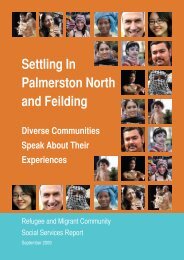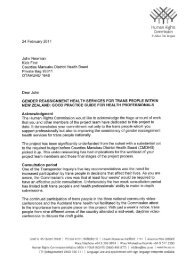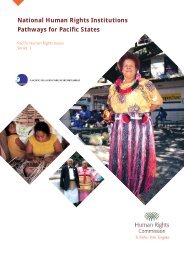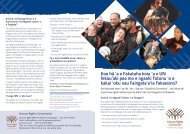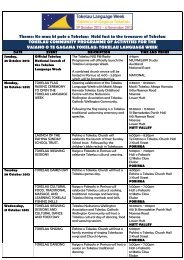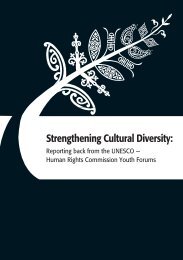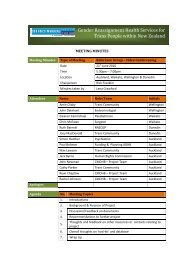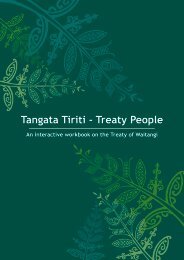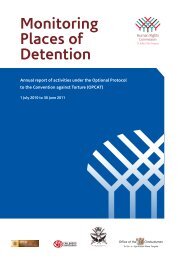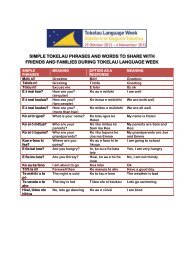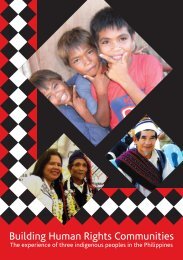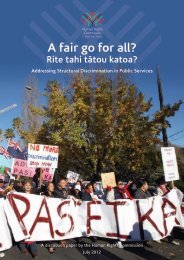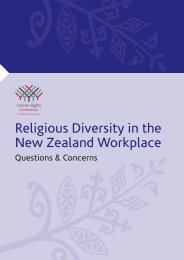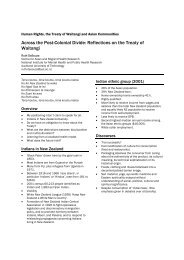Statement of Intent 2013 to 2016 - Human Rights Commission
Statement of Intent 2013 to 2016 - Human Rights Commission
Statement of Intent 2013 to 2016 - Human Rights Commission
You also want an ePaper? Increase the reach of your titles
YUMPU automatically turns print PDFs into web optimized ePapers that Google loves.
12 HUMAN RIGHTS COMMISSION | STATEMENT OF INTENTThe Education Review Office has found that schools withinitiatives specific <strong>to</strong> Mäori and Pacific needs and culturalpractices are more effective in building relationships andenhancing student achievement.The link between poverty and children’s ability <strong>to</strong> fullyengage in education is critical. Socio-economic fac<strong>to</strong>rs –including poverty – play a key role in determining inequitableeducational outcomes. The NCEA Level 1 pass rate at thepoorest 30 per cent <strong>of</strong> schools is only two-thirds that <strong>of</strong> thewealthiest 30 per cent <strong>of</strong> schools.In New Zealand, the right <strong>to</strong> education for studentswith disabilities is not established in a way consistentlyguaranteeing these students the ability <strong>to</strong> attend their localState school and receive an education aimed at full realisation<strong>of</strong> their abilities and talents. In 2010, the Education ReviewOffice reviewed how well schools demonstrated inclusivepractices, finding that only 50 per cent <strong>of</strong> schools surveyedwere fully inclusive, 30 per cent were partially inclusive,and 20 per cent were not inclusive. The Education ReviewOffice will now measure and report on schools’ performancein achieving a fully inclusive school. Evaluation indica<strong>to</strong>rsinclude: presence, participation and engagement, andachievement <strong>of</strong> students with high needs. Furthermore, theDisability Convention independent moni<strong>to</strong>ring mechanism,<strong>of</strong> which the <strong>Commission</strong> is part, is working on guidelines onreasonable accommodation in education, led by the Office <strong>of</strong>the Ombudsman.The Ministry <strong>of</strong> Education is prioritising improvement <strong>of</strong>education outcomes for Mäori students, Pacific students,students with special education needs, and students from lowsocio-economic areas. The Ministry measures the increase inthe number <strong>of</strong> children accessing early childhood educationas a result <strong>of</strong> targeted participation projects. This measurecovers all children, but is only disaggregated by threepopulation groups: Mäori, Pacific peoples, and children fromlow socio-economic areas. Educational outcomes for studentswith disabilities are difficult <strong>to</strong> improve if data is not alsodisaggregated for this group <strong>of</strong> students.An important aspect <strong>to</strong> reducing inequalities is access <strong>to</strong>information and communication in indigenous or communitylanguages. There is no national strategy for New ZealandSign Language (NZSL), reflected in a lack <strong>of</strong> standards andinfrastructure, including insufficient numbers <strong>of</strong> NZSLinterpreters. Mäori deaf are particularly poorly served, withonly two qualified tri-lingual interpreters in New Zealand.The future <strong>of</strong> te reo Mäori remains under scrutinyfollowing the 2011 publication <strong>of</strong> major reports by theWaitangi Tribunal and a Ministerial Review Panel. Thedevelopment <strong>of</strong> a new Mäori Language Strategy is urgentlyneeded <strong>to</strong> address issues raised in the reports. The PacificLanguages Framework was completed in 2012, addressingthe declining use <strong>of</strong> Pacific languages in New Zealand.However, a similar strategy for other community languagesis required in recognition <strong>of</strong> the importance <strong>of</strong> languageretention <strong>to</strong> culture.What we will doOver the next three years, we will deliver services thatincrease awareness and application <strong>of</strong> human rightsby the State sec<strong>to</strong>r and the community in the areas <strong>of</strong>employment and education.We will advocate and encourage implementation <strong>of</strong> tereo Mäori; NZSL; community languages and strategies;and support promotional language weeks, given theirimportance in building stronger and more productive NewZealand communities.We will scope ways <strong>to</strong> encourage the scaling <strong>of</strong> goodpractice in the education system that have led <strong>to</strong> improvedinclusion and better educational outcomes for studentswho live in economic decile 1–3 areas, and identify howwe can assist this process.Beyond <strong>2013</strong>–14, our work will be shaped by the humanrights priorities identified through the second national plan<strong>of</strong> action for the promotion and protection <strong>of</strong> human rightsin New Zealand.During <strong>2013</strong>–14, we will:1 scope ways <strong>to</strong> encourage the scaling <strong>of</strong> good practicein the education system that have led <strong>to</strong> improvedinclusion and better educational outcomes for studentswith disabilities2 provide advice <strong>to</strong> the State Services <strong>Commission</strong>, theMinistry <strong>of</strong> Health and the Ministry <strong>of</strong> Education onreducing structural discrimination in employment inthe State sec<strong>to</strong>r, including advice on pay equity andemployment discrimination



